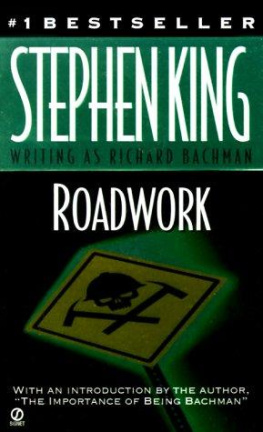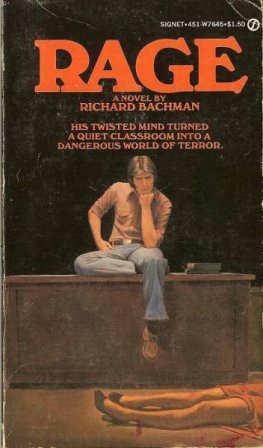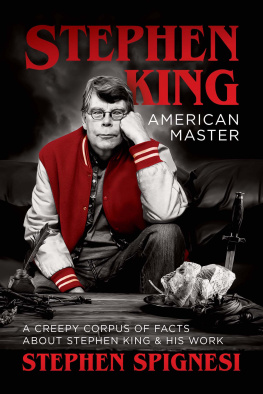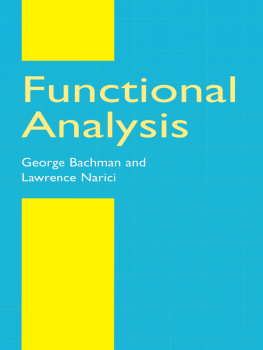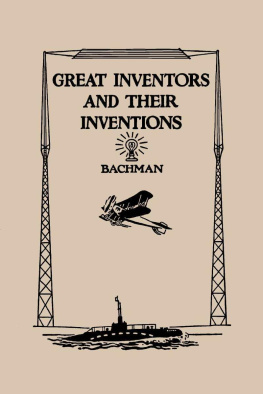For Tommy and Lori Spruce
And thinking of James T. Farrell
These are the slums of the heart.
JOHN D. MAC DONALD
DEAR CONSTANT READER,
This is a trunk novel, okay? I want you to know that while youve still got your sales slip and before you drip something like gravy or ice cream on it, and thus make it difficult or impossible to return. Its a revised and updated trunk novel, but that doesnt change the basic fact. The Bachman name is on it because its the last novel from 1966-1973, which was that gentlemans period of greatest productivity.
During those years I was actually two men. It was Stephen King who wrote (and sold) horror stories to raunchy skin mags like Cavalier and Adam, All four were published as paperback originals.
Blaze was the last of those early novelsthe fifth quarter, if you like. Or just another well-known writers trunk novel, if you insist. It was written in late 1972 and early 1973. I thought it was great while I was writing it, and crap when I read it over. My recollection is that I never showed it to a single publisher not even Doubleday, where I had made a friend named William G. Thompson. Bill was the guy who would later discover John Grisham, and it was Bill who contracted for the book following Blaze, a twisted but fairly entertaining tale of prom-night in central Maine.
I forgot about Blaze for a few years. Then, after the other early Bachmans had been published, I took it out and looked it over. After reading the first twenty pages or so, I decided my first judgment had been correct, and returned it to purdah. I thought the writing was okay, but the story reminded me of something Oscar Wilde once said. He claimed it was impossible to read The Old Curiosity Shop without weeping copious tears of laughter. So Blaze was forgotten, but never really lost. It was only stuffed in some corner of the Fogler Library at the University of Maine with the rest of their Stephen King/Richard Bachman stuff.
Blaze ended up spending the next thirty years in the dark.
The whole project was a blast except for the slow royalty payments.
About a year later, I thought maybe Id like to go the Hard Case route again, possibly with something that had a harder edge. My thoughts turned to Blaze for the first time in years, but trailing along behind came that damned Oscar Wilde quote about The Old Curiosity Shop. The Blaze I remembered wasnt hardboiled noir, but a three-handkerchief weepie. Still, I decided it wouldnt hurt to look. If, that was, the book could even be found. I remembered the carton, and I remembered the squarish type-face (my wife Tabithas old college typewriter, an impossible-to-kill Olivetti portable), but I had no idea what had become of the manuscript that was supposedly inside the carton. For all I knew, it was gone, baby, gone.
It wasnt. Marsha, one of my two valuable assistants, found it in the Fogler Library. She would not trust me with the original manuscript (I, uh, lose things), but she made a Xerox. I must have been using a next-door-to-dead typewriter ribbon when I composed Blaze, because the copy was barely legible, and the notes in the margins were little more than blurs. Still, I sat down with it and began to read, ready to suffer the pangs of embarrassment only ones younger, smart-assier self can provide.
But I thought it was pretty good certainly better than Roadwork, which I had, at the time, considered mainstream American fiction. It just wasnt a noir novel. It was, rather, a stab at the sort of naturalism-with-crime that James M. Cain and Horace McCoy practiced in the thirties. in places, but it had been written by a young man (I was twenty-five) who was convinced he was WRITING FOR THE AGES.
I thought Blaze could be re-written and published without too much embarrassment, but it was probably wrong for Hard Case Crime. It was, in a sense, not a crime novel at all. I thought it could be a minor tragedy of the underclass, if the re-writing was ruthless. To that end, I adopted the flat, dry tones which the best noir fiction seems to have, even using a type-font called American Typewriter to remind myself of what I was up to. I worked fast, never looking ahead or back, wanting also to capture the headlong drive of those books (Im thinking more of Jim Thompson and Richard Stark here than I am of Cain, McCoy, or Farrell). I thought I would do my revisions at the end, with a pencil, rather than editing in the computer, as is now fashionable. If the book was going to be a throwback, I wanted to play into that rather than shying away from it. I also determined to strip all the sentiment I could from the writing itself, wanted the finished book to be as stark as an empty house without even a rug on the floor. My mother would have said I wanted its bare face hanging out. Only the reader will be able to judge if I succeeded.
If it matters to you (it shouldnt hopefully you came for a good story, and hopefully you will get one), any royalties or subsidiary income generated by Blaze will go to The Haven Foundation, which was created to help freelance artists who are down on their luck.
One other thing, I guess, while Ive got you by the lapel. I tried to keep the Blaze time-frame as vague as possible, so it wouldnt seem too dated. If you think of this storys time-frame as America, Not All That Long Ago, I think youll be okay.
May I close by circling back to where I started? This is an old novel, but I believe I was wrong in my initial assessment that it was a bad novel. You may disagree but The Little Match Girl it aint. As always, Constant Reader, I wish you well, I thank you for reading this story, and I hope you enjoy it. I wont say I hope you mist up a little, but
Yeah. Yeah, I will say that. Just as long as theyre not tears of laughter.
Stephen King (for Richard Bachman)
Sarasota, Florida
January 30th, 2007
GEORGE WAS SOMEWHERE in the dark. Blaze couldnt see him, but the voice came in loud and clear, rough and a little hoarse. George always sounded as if he had a cold. Hed had an accident when he was a kid. He never said what, but there was a dilly of a scar on his adams apple.
Not that one, you dummy, its got bumper stickers all over it. Get a Chevy or a Ford. Dark blue or green. Two years old. No more, no less. Nobody remembers them. And no stickers.
Blaze passed the little car with the bumper stickers and kept walking. The faint thump of the bass reached him even here, at the far end of the beer joints parking lot. It was Saturday night and the place was crowded. The air was bitterly cold. He had hitched him a ride into town, but now he had been in the open air for forty minutes and his ears were numb. He had forgotten his hat. He always forgot something. He had started to take his hands out of his jacket pockets and put them over his ears, but George put the kibosh on that. George said his ears could freeze but not his hands. You didnt need your ears to hotwire a car. It was three above zero.
There, George said. On your right.
Blaze looked and saw a Saab. With a sticker. It didnt look like the right kind of car at all.
Thats your left, George said. Your right, dummy. The hand you pick your nose with.
Im sorry, George.
Yes, he was being a dummy again. He could pick his nose with either hand, but he knew his right, the hand you write with. He thought of that hand and looked to that side. There was a dark green Ford there.
Blaze walked over to the Ford, elaborately casual. He looked over his shoulder. The beer joint was a college bar called The Bag. That was a stupid name, a bag was what you called your balls. It was a walk-down. There was a band on Friday and Saturday nights. It would be crowded and warm inside, lots of little girls in short skirts dancing up a storm. It would be nice to go inside, just look around



